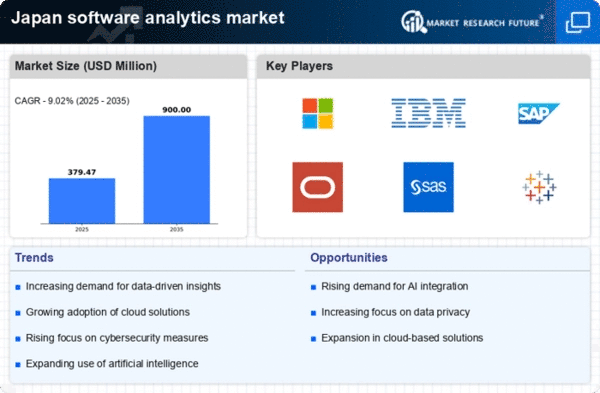Focus on Enhanced User Experience
In the software analytics market, there is a growing emphasis on enhancing user experience. Japanese companies are increasingly seeking analytics solutions that are not only powerful but also user-friendly. This trend is reflected in the design of analytics tools that prioritize intuitive interfaces and accessibility. As a result, the market is witnessing a shift towards solutions that cater to non-technical users, enabling broader adoption across various departments. Approximately 70% of organizations in Japan indicate that ease of use is a critical factor in their software selection process, highlighting the importance of user-centric design in the software analytics market.
Growth of IoT and Connected Devices
The proliferation of Internet of Things (IoT) devices in Japan is driving growth in the software analytics market. As more devices become interconnected, the volume of data generated is increasing exponentially. This surge in data presents both challenges and opportunities for businesses seeking to harness insights from IoT-generated information. The software analytics market is evolving to accommodate this influx, with solutions designed to analyze vast datasets from diverse sources. Projections indicate that the market could expand by 25% over the next few years, fueled by the need for analytics that can effectively process and interpret IoT data.
Rising Demand for Real-Time Insights
The software analytics market in Japan experiences a notable surge in demand for real-time insights. Businesses increasingly recognize the necessity of immediate data analysis to enhance decision-making processes. This trend is particularly evident in sectors such as retail and finance, where timely information can lead to competitive advantages. According to recent data, approximately 65% of organizations in Japan prioritize real-time analytics to improve operational efficiency. The software analytics market is thus adapting to provide solutions that facilitate instant data processing and visualization, enabling companies to respond swiftly to market changes.
Increased Investment in Data Security
As data breaches become more prevalent, the software analytics market in Japan is witnessing increased investment in data security measures. Organizations are prioritizing the protection of sensitive information, leading to a rise in demand for analytics solutions that incorporate robust security features. This trend is particularly significant in industries such as healthcare and finance, where data integrity is paramount. Recent statistics suggest that nearly 80% of companies in Japan are allocating additional resources to enhance their data security frameworks, thereby influencing the software analytics market to innovate and provide secure analytics solutions.
Integration of Advanced Machine Learning Techniques
The integration of advanced machine learning techniques into the software analytics market is transforming how organizations analyze data. In Japan, companies are leveraging machine learning algorithms to uncover patterns and trends that were previously difficult to detect. This shift is expected to drive market growth, with projections indicating a potential increase of 30% in the adoption of machine learning tools within the next five years. The software analytics market is responding by developing more sophisticated analytics platforms that incorporate these technologies, allowing businesses to gain deeper insights and enhance predictive capabilities.
















